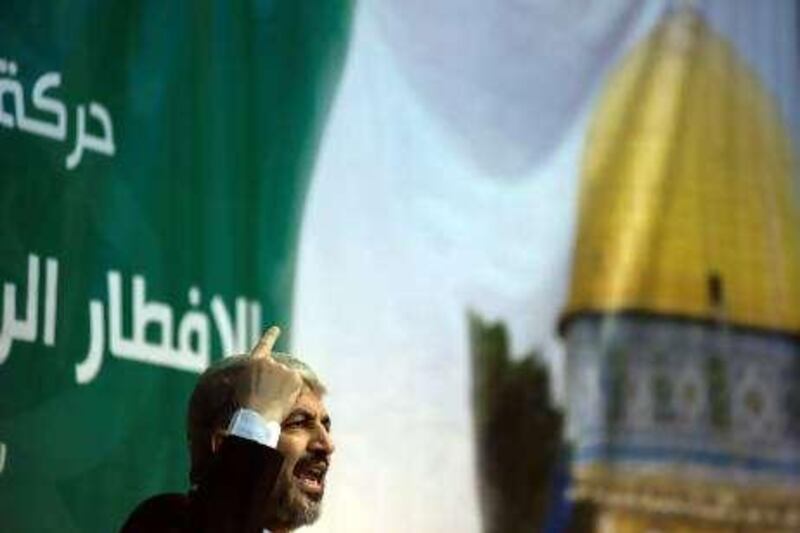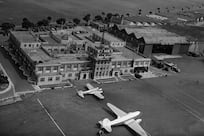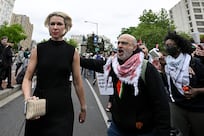DAMASCUS // The resumption of Middle East peace talks has been dismissed by the Hamas leader, Khalid Meshaal, as nothing more than a public relations exercise, designed to help the US president in the run-up to mid-term elections and polish Israel's tarnished image after its assault on an aid flotilla. Speaking on Tuesday night in Damascus, where he lives in exile, Mr Meshaal said the direct talks, due to begin in Washington next week, were not a sincere effort to end more than 60 years of war and would, therefore, not result in a peace agreement.
He urged the Egyptian president, Hosni Mubarak, and Jordan's King Abdullah II not to take part in the discussions. They have been invited by US mediators to attend negotiations led by Mahmoud Abbas, the president of the Palestinian Authority (PA), and Benjamin Netanyahu, the Israeli prime minister. "For the Americans, President [Barack] Obama is looking to appeal to voters ahead of the coming midterm elections and Israel wants to repair the damage to its image after the Gaza war, the Lebanon war and the 'Freedom Flotilla'," Mr Meshaal told The National after a speech in which he warned that the consequences of the summit could be "catastrophic" for the region.
"By entering these talks, Netanyahu can present an image that Israel is concerned about peace, and he will do so with an Arab umbrella [if Jordan and Egypt attend], this is helping Netanyahu polish his photo in the eyes of the world. There are no Palestinian or Arab reasons for these talks." Meaningful peace talks would require, among other things, an end to Palestinian divisions, which have split the Hamas-controlled Gaza Strip from the PA-administered West Bank, Mr Meshaal said. But faltering reconciliation efforts had been undermined by the resumption of direct talks, he insisted.
Hamas officials in Gaza had been due to hold a meeting with their PA counterparts, but that was cancelled as soon as the Washington talks were announced, Mr Meshaal said, because Hamas did not want them to be seen as a sign of its support. "Reconciliation is now delayed. It's not a priority - the priority is the direct talks," he said. "There has been an American veto on Palestinian reconciliation; they want to focus on the direct talks and to benefit from the division and weakness of the Palestinian political position."
Hamas's refusal to endorse the negotiations means that, even in the unlikely event of an agreement between the PA and Israel, a major Palestinian faction - one powerful enough to have won elections and retain control of Gaza in the face of a crippling siege and international isolation - will not have signed up to the deal. Mr Meshaal made it clear Hamas would not adhere to the terms of any peace agreement should one arise from the talks, calling them "illegitimate" and saying they "do not commit our people to anything".
The direct Palestinian-Israeli negotiations are the first since the previous effort collapsed without making progress two years ago, when Israel launched a devastating 22-day military offensive on the Gaza Strip. Despite Hamas's total rejection of the talks, the White House has said it is "very hopeful" they will bring an end to decades of conflict. The Obama administration has said it aims to see a complete peace settlement within a year, resulting in the creation of an independent Palestinian state.
Mr Obama, who made a point of trying to reach out to Arab public opinion in the early days of his presidency, has struggled to make any progress on Middle East peace, admitting the issue was more difficult to solve than he had anticipated. His Democratic Party is contesting mid-term elections in two months, under huge pressure from Republican rivals, and would surely benefit from some positive Middle East news.
There is a chance, however, that the talks, brokered by the quartet - the United States, the European Union, Russia and the United Nations - will break down almost immediately over Israeli construction of settlements in the occupied territories. Palestinian negotiators have said they will withdraw from discussions if Israel ends a temporary freeze on the building that is due to expire on September 26.
Israel has built more than 100 settlements, considered illegal under international law, in the West Bank and East Jerusalem since the 1967 occupation began. Washington had called for a total halt on construction, but later climbed down over the matter. Before next week's talks, Mr Netanyahu has said reaching a peace agreement "is a difficult challenge but is possible". The chief Palestinian negotiator, Saeb Erekat, has said Israel will have to make a choice between building settlements and peace. "I hope they choose peace," he said. "I hope that Mr Netanyahu will be our partner in peace."
While the PA and the Israeli government are preparing for the summit, Mr Meshaal said mediation between Hamas and Israel over a prisoner swap had "reached a blocked door" and that "nothing [now] was happening" over the issue. Hamas has held Gilad Shalit as a prisoner since 2006, and has refused to release the Israeli soldier unless Israel frees hundreds of the thousands of Palestinians held in its jails.
@Email:psands@thenational.ae





